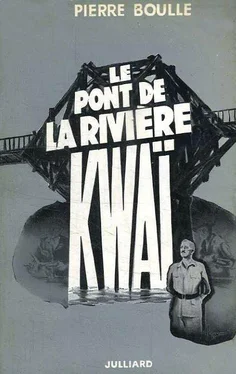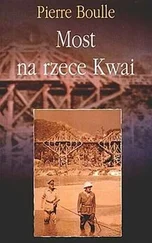“The bloody bridge still isn’t built. The bloody Emperor’s bloody railway still hasn’t got across the bloody river in this bloody country. The bloody C.O.’s right; he knows what he’s talking about. If you see him, tell him we’re all for him. The bloody baboon hasn’t heard the last of the bloody British army.”
The most brutal forms of punishment had achieved so result at all. The men were used to them. The example set by Colonel Nicholson was a stimulant even stronger than the beer and whisky which they no longer had to drink. If one of them was ever punished beyond the limits of human endurance and could only go on working at the risk of his life, there was always another ready to relieve him. This was a recognized routine.
In Clipton’s opinion, they were even more to be praised for refusing to be taken in by the mealy-mouthed promises which Saito made during those fits of depression when he realized he had exhausted every known form of torture and was incapable of inventing others.
One day he made them parade outside his office, having ordered them to stop work earlier than usual—so as not to overtire them, he explained. He issued them all rice cakes and fruit bought from the Siamese peasants in the nearest village—a gift from the Japanese army to spur them on to greater efforts. He abandoned all sense of shame and positively groveled in front of them. He prided himself, he told them, on being one of them, just an ordinary fellow whose only wish was to do his duty with as little fuss as possible. Their officers, he pointed out, were making them all work twice as hard by refusing to work themselves. So he fully understood how resentful they must feel, and did not hold it against them. On the contrary, in order to show his sympathy for them, he had on his own authority reduced the individual quota of work on the embankment. The engineer had fixed this as one and a half cubic yards of earth per man; well, he, Saito, had decided to make it one cubic yard. He was doing this because he felt sorry for them in their present condition, for which he himself was not to blame. He hoped that, in view of this kindly gesture, they would co-operate with him and speed up this easy work, which would help to bring the damn war to an end.
He was almost pleading with them by the time he had finished, but his prayers and entreaties had no more effect than his curses and blows. Next day the quota was fulfilled. Each man conscientiously dug up and carted off his cubic yard of earth; some even more. But the distance they carried it was an insult to the meanest intelligence.
Saito was the first to yield. He was at the end of his rope; the prisoners’ sustained resistance had reduced him to a pitiful condition. He spent the days preceding his final downfall prowling about the camp with the same desperate look in his eyes as a beast at bay. He even went so far as to ask the youngest and least experienced lieutenants to choose for themselves what work they wanted to do, promising them special privileges and extra rations. But they all stood firm and, since a high-level Japanese inspection was imminent, he resigned himself to ignominious surrender.
He prepared to make one last desperate bid to “save face” and cover up his defeat, but this pathetic attempt did not even deceive his own men. December 7, 1942, being the anniversary of Japan’s entry into the war, he announced that in honor of the occasion he had undertaken to grant a general amnesty. He had an interview with the Colonel and told him he had adopted a measure of extreme benevolence; all officers would henceforth be exempt from manual labor. In return for this, he trusted they would devote themselves to supervising their men’s activity so as to ensure the maximum efficiency.
Colonel Nicholson replied that he would see what could be done. Now that the situation was established on a proper constitutional basis there was no longer any reason for trying to oppose the enemy program. As in every civilized army, the officers—it went without saying —would be responsible for the conduct of their men.
This was total surrender on the part of the Japanese. That evening the victory was celebrated in the British camp with songs, cheers, and an extra rice ration, which had been issued with the greatest reluctance on Saito’s orders as a further gesture of good will. That same evening the Japanese colonel retired earlier than usual, wept for his loss of face, and drowned his sorrows in a bout of solitary drinking which lasted well into the night; until he slumped dead drunk onto his bed—a. state which he hardly ever managed to reach except in unusual circumstances, for he had an amazingly strong head and could normally stand the most barbaric mixtures.
Colonel Nicholson, accompanied by his usual advisers, Major Hughes and Captain Reeves, went down to the river along the railway embankment on which the prisoners were at work.
He walked slowly. He was in no hurry. Immediately after his release he had scored a second victory by obtaining four days off duty for his officers and himself to compensate for their unjust punishment. Saito had clenched his fists at the thought of this further delay, but had given in. He had even issued orders for the prisoners to be decently treated, and had bashed in the face of one of his own soldiers whom he had caught smiling sarcastically.
If Colonel Nicholson had applied for four days’ exemption from duty, it was not only to recover his strength; it was also to give him time to think, to sum up the situation, to hold discussions with his staff, and draw up a plan of action—steps which every conscientious commander should take instead of rushing blindly at the easiest solution, a thing he hated doing more than anything else in the world.
It did not take him long to spot the outrageous mistakes intentionally committed by his men. Hughes and Reeves could not suppress a cry of admiration when they saw the astonishing results of this activity.
“That’s a fine embankment for a railway line!” said Hughes. “I suggest you put the culprits up for a decoration, sir. Just think of an ammunition train trundling over that lot!”
The Colonel did not even smile.
“A splendid job, sir,” echoed Captain Reeves, the ex-public-works engineer. “No one in his senses could possibly imagine they intend to run a railway over this switchback. I’d sooner face the Japanese army all over again than take a trip along this line.”
The Colonel looked as solemn as ever and asked:
“In your opinion, Reeves, your opinion as a technician, could this be put to any use at all?”
“I don’t think so, sir,” Reeves answered after a moment’s reflection. “They’d do better to abandon this mess completely and build another line a little further up.”
Colonel Nicholson looked more and more preoccupied. He nodded his head and moved on in silence. He wanted to see the whole of the building yards before forming an opinion.
He reached the river. A squad of about fifty men, stark naked except for the triangle of cloth which the Japanese called “working kit,” were milling about on the stretch under construction. A guard, with rifle slung, marched up and down in front of them. Some of the squad were engaged in digging a little further away, while the remainder were busy collecting the earth on bamboo carriers and spreading it out on either side of a line marked out with white pegs. This had originally run at right angles to the bank, but the insidious genius of the prisoners had succeeded in shifting it so that it was now almost parallel to the river. The Japanese engineer was not on the spot. He could be seen on the opposite bank gesticulating in the middle of another squad, who were taken across the river every morning on rafts. He could also be heard.
Читать дальше











